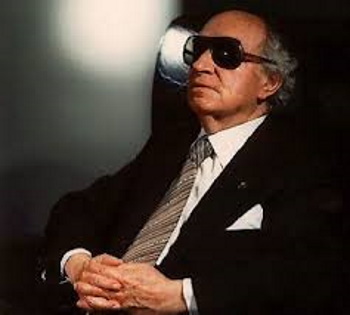
Joaquín Rodrigo Vidre (22 November 1901 – 6 July 1999), was a Spanish composer and a virtuoso pianist. He is best known for composing the Concierto de Aranjuez, a cornerstone of the classical guitar repertoire. At the age of three, he lost his sight completely after contracting diphtheria. At the age of eight he began to study solfège, piano, and violin and later he studied harmony and composition. He wrote his compositions in Braille and they were transcribed for publication. Rodrigo studied music under Francisco Antich in Valencia and under Paul Dukas at the École Normale de Musique in Paris. Thereafter, he studied musicology, first under Maurice Emmanuel, and then under André Pirro. His most famous work, the Concierto de Aranjuez, was composed in 1939 in Paris for the virtuoso guitarist Regino Sainz de la Maza. In 1974, Rodrigo adapted the concerto for harp at the request of Nicanor Zabaleta. From 1947, Rodrigo held the Manuel de Falla Chair of Music at the Complutense University of Madrid. Throughout his long life, Rodrigo composed commissioned works for some of the great virtuoso musicians of the times - Andres Segovia, James Galway, The Romeros and Julian Lloyd Weber, to name a few. He received the prestigious Prince of Asturias Award – Spain's highest civilian honor – in 1996.


